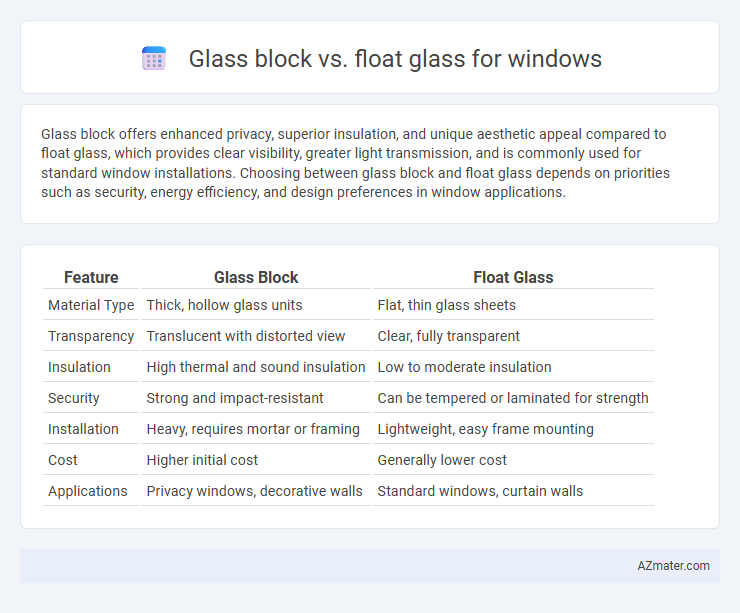Glass block offers enhanced privacy, superior insulation, and unique aesthetic appeal compared to float glass, which provides clear visibility, greater light transmission, and is commonly used for standard window installations. Choosing between glass block and float glass depends on priorities such as security, energy efficiency, and design preferences in window applications.
Table of Comparison
| Feature | Glass Block | Float Glass |
|---|---|---|
| Material Type | Thick, hollow glass units | Flat, thin glass sheets |
| Transparency | Translucent with distorted view | Clear, fully transparent |
| Insulation | High thermal and sound insulation | Low to moderate insulation |
| Security | Strong and impact-resistant | Can be tempered or laminated for strength |
| Installation | Heavy, requires mortar or framing | Lightweight, easy frame mounting |
| Cost | Higher initial cost | Generally lower cost |
| Applications | Privacy windows, decorative walls | Standard windows, curtain walls |
Introduction to Glass Block and Float Glass
Glass block, consisting of thick, hollow glass units, offers enhanced privacy and thermal insulation while providing distinctive aesthetics for window installations. Float glass, produced by floating molten glass on a bed of molten metal, delivers a smooth, uniform surface ideal for clear views and versatile applications in residential and commercial windows. Comparing their structural properties, glass blocks emphasize durability and light diffusion, whereas float glass prioritizes transparency and design flexibility.
Fundamental Differences Between Glass Block and Float Glass
Glass block consists of thick, molded glass units typically used for privacy and enhanced thermal insulation, offering a textured surface that diffuses light while maintaining security. Float glass, produced by floating molten glass on a bed of molten metal, provides a smooth, transparent, and flat surface suitable for maximum visibility and modern window designs. The fundamental differences lie in glass block's structural rigidity and opacity versus float glass's clarity and versatility in size and thickness.
Material Composition and Manufacturing Process
Glass blocks are composed primarily of two thick layers of glass fused together with air trapped inside, providing enhanced insulation and privacy through their cellular structure created by a pressing and cooling process. Float glass is made from molten glass floated on a bed of molten tin, resulting in a smooth, uniform thickness ideal for clear windows, produced using the float process developed by Pilkington in the 1950s. The manufacturing differences lead to glass blocks offering higher thermal and sound insulation, while float glass provides clarity and flatness suited for standard window applications.
Aesthetics and Design Flexibility
Glass blocks offer a distinctive, textured appearance that diffuses light and provides privacy, ideal for creating decorative patterns and visual interest in windows. Float glass delivers a smooth, transparent surface that allows maximum clarity and design flexibility, supporting a wide range of customization options like tinting, frosting, and etching. The choice between glass block and float glass depends on the desired balance of artistic expression versus unobstructed views in architectural design.
Thermal Insulation and Energy Efficiency
Glass block windows provide superior thermal insulation due to their thicker, multi-layered design that traps air between the blocks, reducing heat transfer and enhancing energy efficiency. Float glass, commonly used in standard windows, offers less insulation as it is a single pane, though double or triple glazing with float glass can improve thermal performance. Choosing glass blocks can significantly reduce heating and cooling costs by maintaining indoor temperatures more effectively than standard float glass.
Security and Safety Considerations
Glass blocks provide enhanced security for windows due to their thick, solid, and non-shatterable composition, making forced entry significantly more difficult compared to float glass. Float glass, while offering clear visibility and ease of installation, is more prone to breakage under impact and generally requires additional safety treatments like laminated or tempered coatings to improve safety and security. For areas prioritizing protection against intrusions and accidents, glass blocks are a superior choice, offering both durability and resistance to impact without compromising safety.
Light Transmission and Privacy
Glass block offers lower light transmission than float glass, typically around 50-70%, providing enhanced privacy by distorting images and preventing clear visibility through the window. Float glass transmits up to 90% of visible light, allowing maximum natural illumination but offering minimal privacy without additional treatments. Choosing between the two depends on the balance needed between bright interiors and secluded spaces.
Durability and Maintenance
Glass block offers superior durability due to its thick, reinforced design that resists impact and harsh weather conditions better than float glass. Float glass, while more prone to scratches and breakage, requires regular cleaning and maintenance to prevent damage from environmental factors. Maintenance for glass blocks is minimal since they do not easily deteriorate or require sealing, whereas float glass windows often need frequent inspections and treatments to maintain their clarity and structural integrity.
Cost Comparison and Installation Factors
Glass block offers higher initial costs than float glass due to its thickness and manufacturing process, yet it reduces expenses over time by providing superior insulation and durability. Float glass is more economical upfront and easier to install, requiring standard framing and handling, which lowers labor costs significantly. Installation of glass blocks demands skilled labor and mortar application, increasing installation time and complexity compared to the straightforward, faster installation of float glass panels.
Best Applications: When to Choose Glass Block vs Float Glass
Glass blocks are ideal for applications requiring enhanced privacy, natural light diffusion, and robust security, making them perfect for bathroom windows, basement walls, and decorative partitions. Float glass is best suited for clear visibility, energy efficiency, and ease of customization, commonly used in residential windows, commercial facades, and curtain walls. Choosing between glass block and float glass depends on balancing factors like privacy, light transmission, thermal insulation, and architectural aesthetics.

Infographic: Glass block vs Float glass for Window
 azmater.com
azmater.com